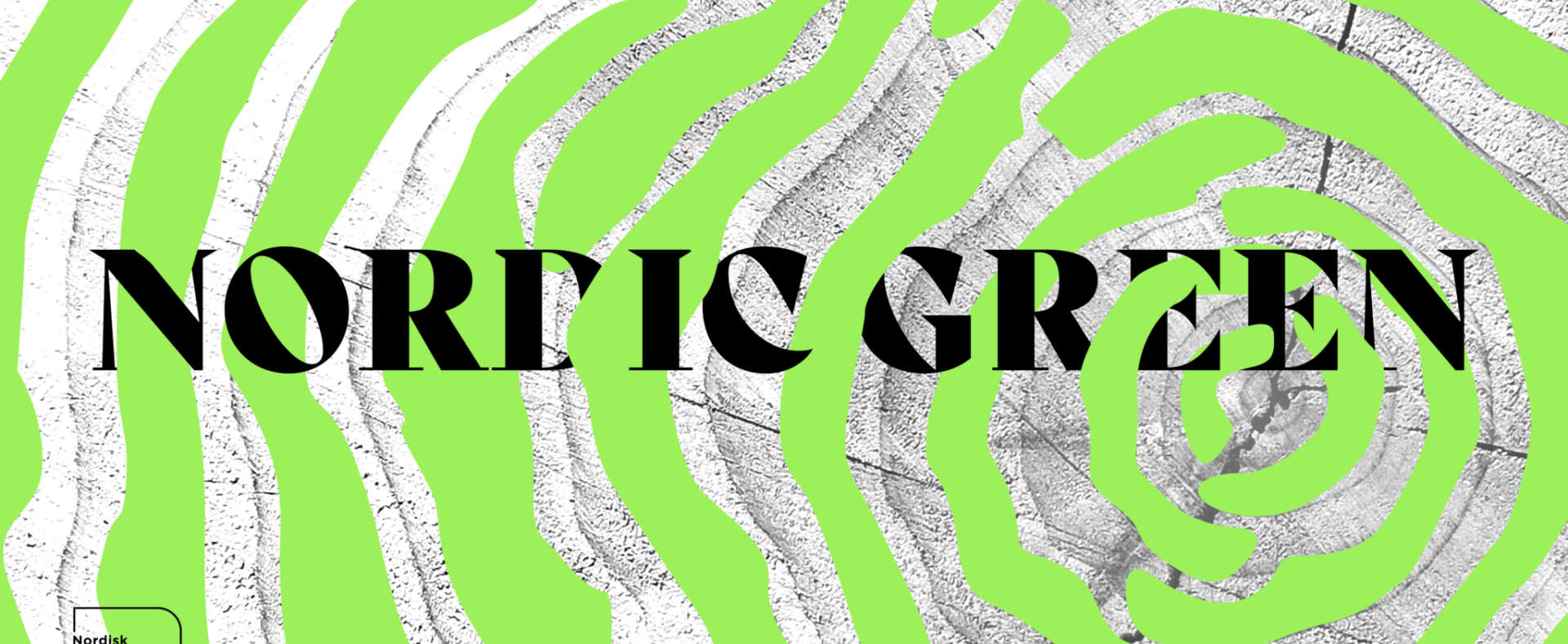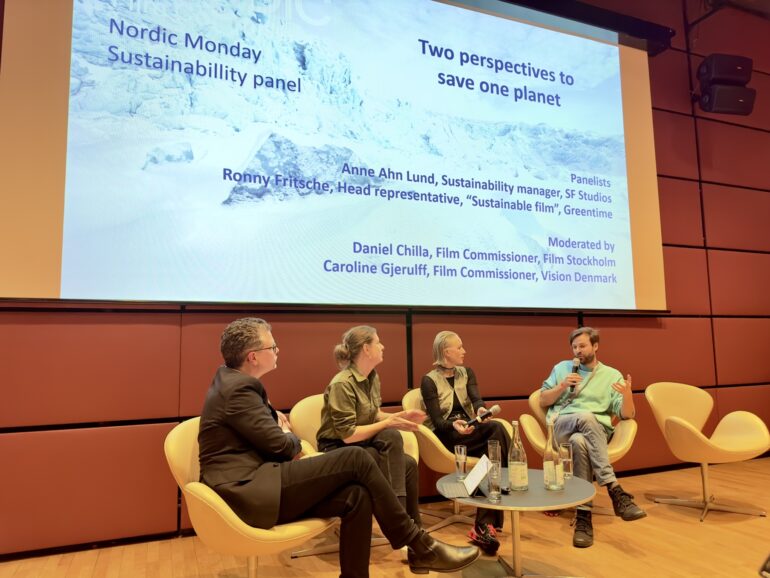
The bedrock of a joint Nordic industry effort was set on Monday in Berlin, as Nordic professionals met to discuss green filming and sustainability at open and closed forums.
The closed-door Nordic Green Summit at Berlin’s Nordische Botschaften-Felleshus, was co-organised by the Nordic Film Commissions and Nordisk Film & TV Fond, as part of the Fund’s ‘Nordic Green’ theme year.
As explained by Liselott Forsman, CEO at Nordisk Film & TV Fond, who moderated the summit, “All of us in the Nordic industry need to coordinate and collaborate on a concrete level now. When planning our Nordic Green theme Year, we early partnered up with the Nordic Film Commissions to openly talk about all green aspects, including the elephant in the room, the travelling footprint caused by our industry’s international financing structures" said Forsman.
Co-organiser Solveig Ræstad, President of Nordic Film Commissions, which consists of a network of 18 regional and national offices, said their vision is for the Nordics “to become the most sustainable filming destination in the world.”
“Our aim is not to stop international co-production, but to make it more sustainable” she explained. “As film commissioners, we get to see our Nordic region through the eyes of the outside world, and the thing that really gets noticed is the long and solid collaboration we have within the Nordics. By joining forces, with all parts of the Nordic film industry, we hope to handle this important task,” she said.
The Nordic Green Summit was attended by nearly 20 decision-makers and experts from the Nordic film institutes, public and private broadcasters, producer organisations, film commissions, the Nordic Eco Media Alliance (NEMA) and the Fund. Altogether, 11 presentations of national, pan-Nordic and EU green strategies where shared and discussed by the participants
Forsman said: ”The seats were limited, to keep the summit effective, but all Fund partners could send a representative and many did.“
Per the head of Nordisk Film & TV Fond,” it was vital to start by this systematic check of what is already done in the Nordics and what should be done, and open forums will follow along the year. It was energising to see film institutes, broadcasters and streaming services share views with producer organisations, film commissions and green experts in a great spirit of collaboration.”
An immediate result of the summit, according to Forsman, is that the Fund will collect and organise Nordic green data to be published on the Fund’s homepage under the new section Industry Insight this spring.
“Another next step is that smaller pan-Nordic working groups now are being set up to create action plans to advance the concrete collaboration on best practices, tools and standards, and to enable discussions on green co-financing and other strategic measures,” Forsman added.
Picking up on this argument, Lund asked if awards shouldn’t also include sustainability factors. “Does it really make sense to give a major award to a company that treats people very badly and doesn’t respect the environment,” she asked, citing the Council of Europe’s co-production fund Eurimages as a company which through its sustainability strategy, is showing the way and awarding good practices behind the scene.
Sitting in the audience, Lena de Geer Head of Sustainability at Viaplay Group agreed with Lund and Fritsche. “Viaplay is very committed to sustainability; we feel it is super important to have tools, training and evaluate things in the end. But we also need to discuss the work environment and I am interviewing crews to make sure they are treated properly,” she declared.
While the first Nordic Green Summit was held behind closed doors, the need for such a joint industry effort was in fact highlighted by SF Studios’ sustainability manager Anne Ahn Lund, during the panel ‘Green Film Productions in the Nordics' - two perspectives to save one planet’ also held February 20 at Berlin’s Nordische Botschaften-Felleshus.
“We need more cooperation in the Nordics”, said Lund, co-founder of NEMA, (CLICK HERE) with a group of Nordic audiovisual sustainability experts, including Swedish producer Ronny Fritsche, who also took part in the Nordic Green Summit.
Both Lund and Fritsche were asked by Daniel Chilla, Film Commissioner at Film Stockholm, to outline their actions and visions for a greener and more sustainable industry.
Lund gave a positive outlook from her experience of working for SF Studios in Denmark. “Firstly, being in-house, they [the rest of SF Studios personnel] can’t ignore me anymore, secondly, being there, I can collect data and share information and thirdly, being attached to every production gives me access to hands-on knowledge. I talk to people on the ground to adjust if necessary the [sustainable-friendly] measures. We concentrate on what we’re doing right now, not too much on the future,” she observed.
For Lund, the Danish industry is now moving fast and eager to turn greener. “The younger generation is also mobilising, so the good vibes and energy is there.”
Looking ahead, she says that besides a greater industry cooperation in the Nordics, what is also needed is “more sustainability managers, more training for them and better dissemination of the information on a pan-Nordic level. There are different tools in each Nordic country, but not many people for instance know what’s happening in Denmark right now. We can learn from each other; we need the talks to come out of the rooms,” she insisted.
Fritsche for his part said “having an in-house sustainability person is excellent, but if you can’t afford that, then you need tools.”
Discussing the Swedish approach, the sustainability expert said that after analysing the UK - originated ‘albert’ tool kit and carbon footprint calculator, he felt that the Swedish industry, with its specific infrastructure, needed a tailor-made approach. “I tried albert, and decided [with other experts] to create a different tool in Sweden that would also include the social and economic aspects of sustainability.
“Combining these three aspects are a step towards creating a truly fully-fledged sustainability,” said Fritsche who works with the specialised company Greentime which offers tools, certification and workshops for professionals.
Expanding on his approach, Fritsche said that sustainability should in fact be part of the quality evaluation of a project. “With other products manufactured, we have different criteria to define what is quality, such as working conditions, eco production. But in film, we don’t do this; we only judge quality based on what’s on screen,” he lamented.
